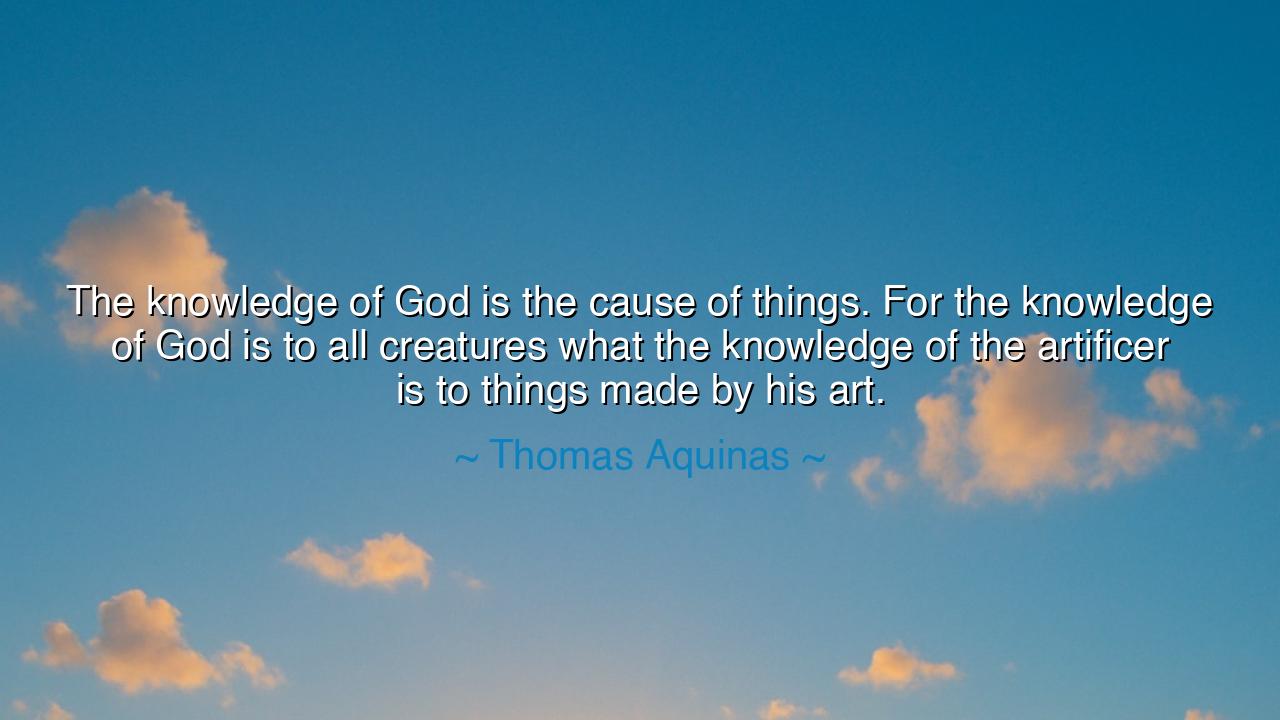
The knowledge of God is the cause of things. For the knowledge of
The knowledge of God is the cause of things. For the knowledge of God is to all creatures what the knowledge of the artificer is to things made by his art.






Hear, O seeker, the words of the great philosopher and saint, Thomas Aquinas: “The knowledge of God is the cause of things. For the knowledge of God is to all creatures what the knowledge of the artificer is to things made by his art.” In this sacred utterance lies the heartbeat of creation itself. He tells us that the universe is no accident, but the unfolding of a divine mind, as deliberate and purposeful as the work of a master craftsman shaping clay. Just as the sculptor envisions the statue before the marble is struck, so too does God’s knowledge precede and sustain all things.
This teaching draws from the ancient well of wisdom: that behind every visible form lies an invisible plan. The artificer knows the design of his work before it is made; the bridge is first born in the mind of the engineer, the song first trembles in the heart of the poet. Likewise, the world exists because the Eternal Craftsman conceived it in His knowledge. Without His thought, there would be only void. Aquinas reminds us that creation is not blind chance, but the radiant expression of divine reason.
Consider the story of the great cathedral builders of the Middle Ages. Long before the stones of Chartres or Notre Dame were lifted into place, the vision of the cathedral lived in the mind of the master architect. To the unknowing, the piles of stone and wood seemed shapeless. But to the one who held the plan, every arch, every window, every soaring spire was already known. In the same way, though our lives may often appear as fragments, to the Divine Architect they are part of a design of unsearchable beauty.
Aquinas’s words also stir within us a truth both humbling and ennobling: every creature is fashioned with intention. The sparrow that sings, the river that flows, the child that laughs—all these flow from God’s knowledge. Nothing is too small, nothing too great, to escape His design. To believe this is to walk in reverence, seeing the world not as chaos, but as sacred order. And to see ourselves as more than dust, but as thoughts of God made flesh.
Yet there is also warning here. For if all things proceed from the knowledge of God, then human arrogance must bow. The artificer does not worship his work; it is the work that reflects the mind of its maker. So too must we remember that our wisdom is but a shadow of the Divine Wisdom. The might of kings, the genius of philosophers, the craft of inventors—all these are but sparks struck from the eternal flame. To forget this is to fall into pride, imagining that man alone is the source of greatness.
History teaches us what happens when men deny this truth. Recall the story of the Tower of Babel, when humanity sought to build a monument to itself, a tower reaching heaven, forgetting the Divine Artificer. In their pride, they believed their own knowledge sufficient, but their speech was confounded, and their work crumbled. For knowledge without humility leads not to creation, but to ruin. Only when man remembers the true Source does his labor endure.
The lesson, therefore, is clear: we are all works of divine artistry, and our lives find meaning when aligned with the design of the Creator. Just as a tool fulfills its purpose only in the hand of the craftsman, so do we find our highest calling when guided by God’s wisdom. This demands of us two things: to live with gratitude, knowing we are part of a divine plan, and to act with humility, seeking not our own glory but to reflect the beauty of the One whose knowledge sustains us.
So, beloved listener, let your heart be still and your eyes be open. See in the rising sun the thought of God, in the stars the handwriting of eternity, and in your own soul the spark of the Divine Artificer. Walk not as one lost in chance, but as one whose every step is known and cherished. For as Aquinas teaches, the knowledge of God is the cause of things, and in remembering this, we walk with purpose, with reverence, and with unshakable hope.






AAdministratorAdministrator
Welcome, honored guests. Please leave a comment, we will respond soon